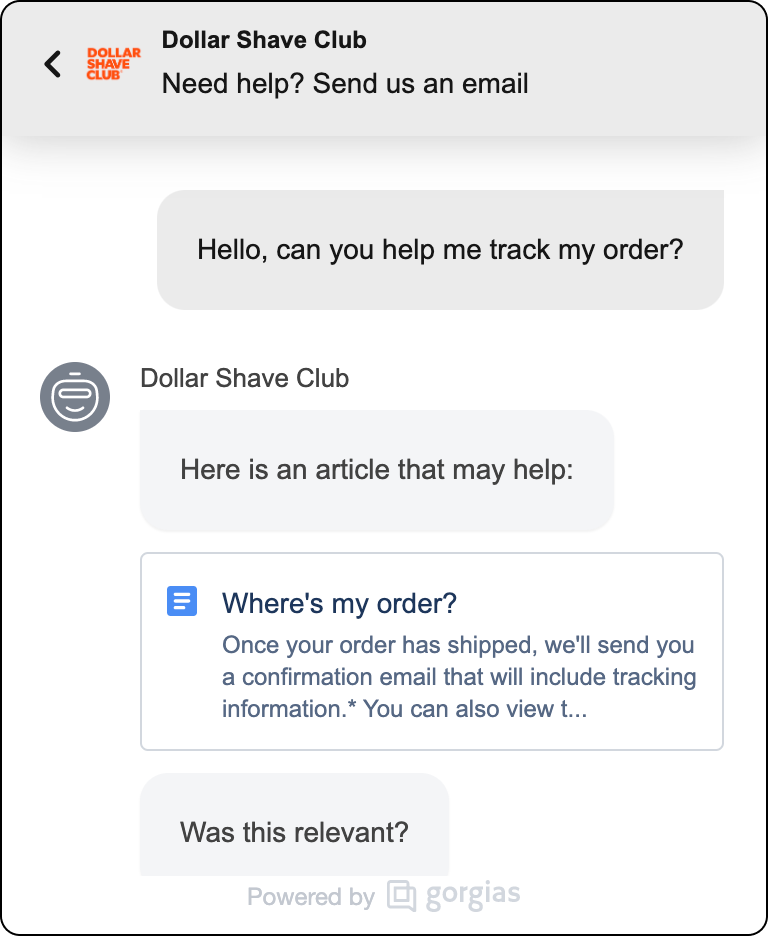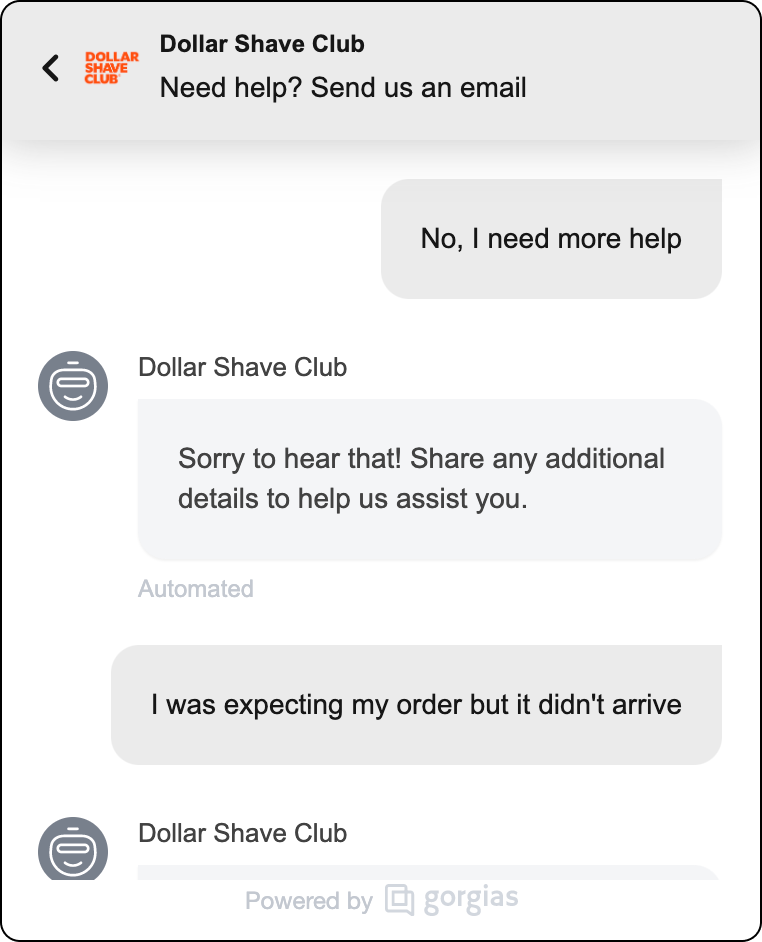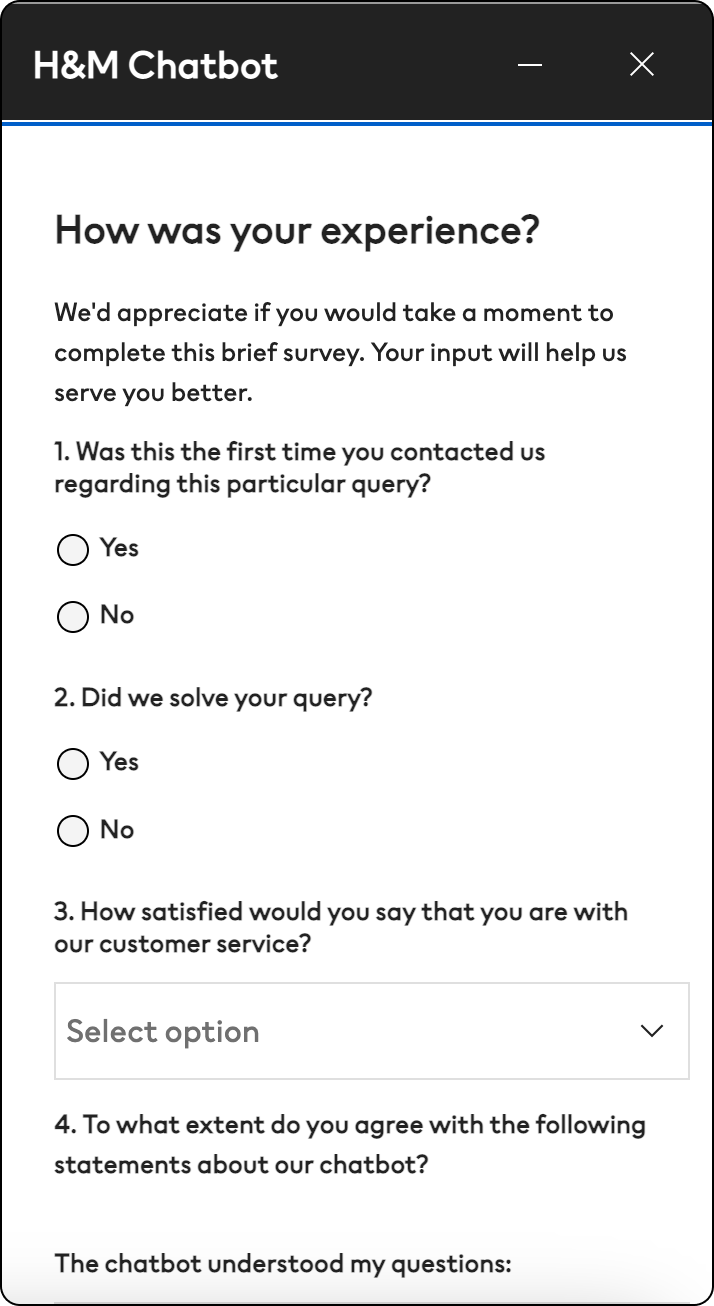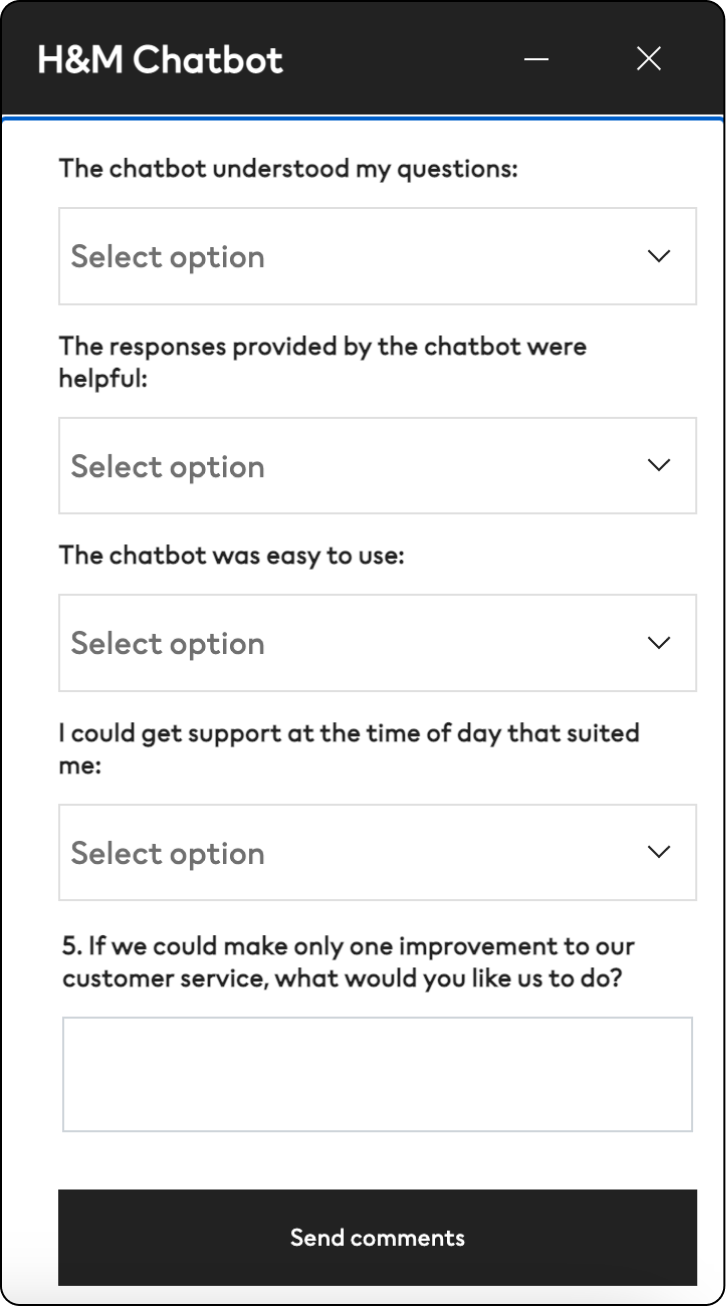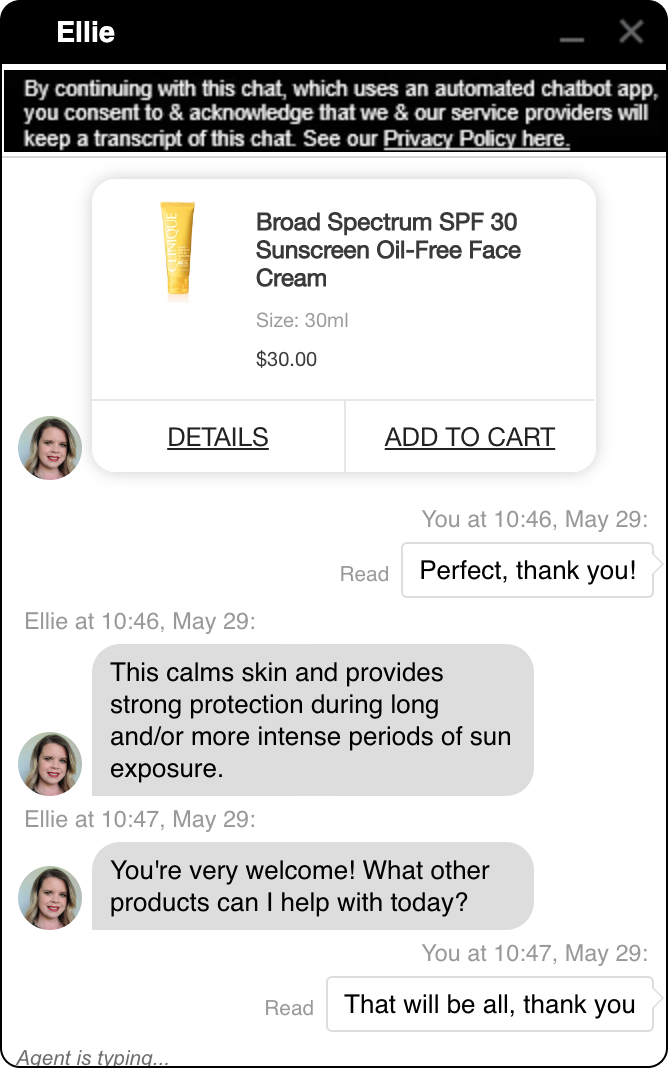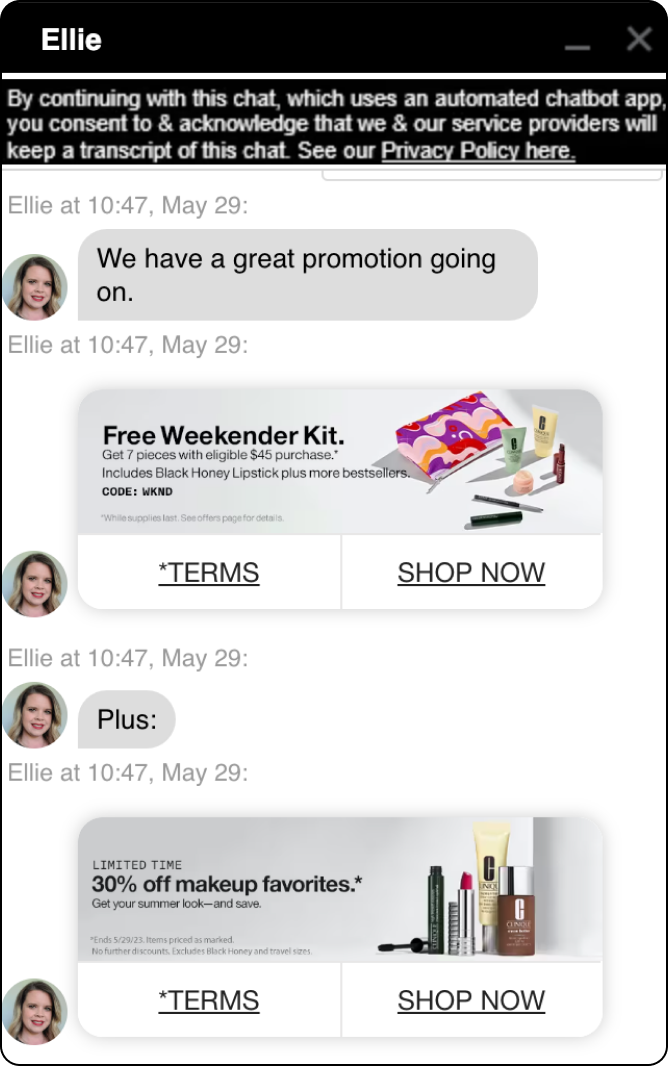AI Agent Use Cases
Generative AI and chatbot technologies are revolutionizing the way businesses and shoppers communicate and are shaping the future of retail before our eyes.
In this article, we discuss:
- Use cases for AI agents
- Benefits
- Real-world examples

Brief Introduction to AI agents
Before exploring the benefits of AI agents, we must understand what it is and it’s importance in Ecommerce.
Defining AI Agents
AI Agents (or Conversational Commerce in more general) enables online shoppers to communicate with their favorite brands through their platform of choice. By opening a messaging app and starting a conversation with an AI agent, shoppers can easily purchase items, receive immediate customer support, and view recommendations tailored to them.
Conversational commerce meets shoppers wherever they are and provides them with what they need. When done effectively, conversational commerce enhances the user experience, builds brand trust, and increases revenue.
In short, it’s essential to an online business’s success. Statista expects global spending on conversational commerce channels to reach almost 300 billion USD by 2025.
Advantages of AI Agents in Retail
AI Agents empowers businesses to foster meaningful connections with customers. Integrating AI-powered chatbots (AI agents) into online platforms enables stores to interact with shoppers in real-time. Thus, shoppers can easily access information and quickly make purchases with confidence.
By implementing conversational commerce, retailers can improve customer satisfaction, build trust, generate more sales, and stand out from competitors.
Enhancing the Customer Experience
By utilizing AI, retailers can use conversational commerce to provide an offline shopping journey online by mimicking the retail assistant’s behavior.
AI Agents and Virtual Shopping Assistants
First, let’s review what AI agents and virtual shopping assistants do.
AI agents and virtual shopping assistants offer support designed to mimic human interaction. They leverage NLP to understand user requests and return intuitive responses that go beyond the scope of pre-programmed replies.

By understanding context and subtle language nuances to provide tailored recommendations, virtual shopping assistants or AI agents act like knowledgeable human salespeople.
They can answer questions, suggest additional products, and provide real-time product information, pricing, and availability instantly.
There are countless ways conversational commerce enhances the online user experience, all of which revolve around real-time interactions that lead to satisfied customers who feel understood and valued. See Toptal’s article for more chatbot UX best practices.
Product Discovery
AI agents can help shoppers find the products they’re looking for by understanding natural language and context of shopper queries.
They can make relevant recommendations to help shoppers complete their order and can leverage advanced filtering options to guide shoppers through product catalogs.
Personalized Product Recommendations
By analyzing user behavior, preferences, and needs, AI agents can deepen customer understanding beyond Autocomplete searches, and provide personalized replies and tailored recommendations.
Personalized product recommendations help shoppers quickly find what they’re looking to buy, round out their purchases with complementary items, and inspire product discovery in areas of your catalog relevant to them. They make shoppers feel understood and help them navigate the shopping journey conveniently and efficiently.
Real-time Order Tracking and Support
Chatbots enable shoppers to track orders in real time, which helps retailers build trust by eliminating uncertainty and offering transparency in the shipping process.
Plus, retailers can offer proactive communication via automated updates and notifications about a delivery. This keeps shoppers in the loop every step of the way.
Ensuring chatbots are attentive and engaging helps manage shoppers’ expectations and reduce frustration, which increases customer satisfaction and loyalty.
Instant Customer Feedback Collection
AI agents give shoppers a voice.
Instant feedback helps online retailers solve problems that may arise during the shopping process. They also help retailers discover pain points, which is insightful data that can be used to optimize the AI agents. Ecommerce businesses can leverage feedback to fine-tune product recommendations, improve the user experience, and enhance customer support.

Collecting feedback helps customers feel like their opinion matters, increases engagement through collaboration, and results in a more satisfying shopping experience.
Sales and Marketing Optimization
Conversational commerce is a powerful tool that can be used to optimize sales and marketing efforts.
Let’s explore how.
Chatbot-Powered Sales Funnels
AI agents are revolutionizing sales funnels. They’re a cost-effective way to generate leads, increase customer engagement, and offer real-time support.
Customer Engagement: Chatbots offer shoppers the ability to quickly navigate the shopping journey by providing personalized recommendations and support. These interactive conversations can guide shoppers through the sales funnel. By addressing users’ individual interests and needs, chatbots keep shoppers engaged and satisfied.
24/7 Support: Chatbots offer real-time support for common queries at any time of day. By providing instant responses, chatbots keep shoppers satisfied while freeing up human support for more complex requests.
Chatbots automate many parts of the sales process and are reshaping the sales landscape as we know it.
Their ability to leverage data and continuously improve helps sales teams promptly and effectively streamline the sales process and drive significant revenue.
Upselling and Cross-selling Strategies
Many shoppers use AI agents to find products they want to purchase. By analyzing user history, purchase behavior, and preferences, chatbots can identify opportunities to cross-sell and upsell.
The most effective way to do this is to offer recommendations that help shoppers discover relevant products. Personalized recommendations that align with what they’re looking for, upgrades, or complementary items that help complete their purchase are proven to increase conversion rate. Additionally, retailers can use chatbots to promote sales, discounts, or items that further support their bottom line.
Product recommendations increase conversion rate, average order value, and revenue. If you’re not using chatbots to upsell and cross-sell, you’re leaving money on the table.
To make sure your strategy is helping achieve your desired results with customer support, we recommend setting and tracking the relevant Ecommerce KPIs.
Interactive Promotions
Interactive promotions alert shoppers to deals, discounts, and promotions that encourage them to buy. They are a lucrative tool for increasing customer engagement, optimizing conversion rate, driving customer loyalty and retention, and helping your brand stand out.
Promoting personalized sales through chatbots or Ecommerce Merchandising is a proactive way to increase customer engagement. Helping shoppers find suitable deals will help you strengthen relationships with customers, create positive user experiences, and build sustainable sales success.
Streamlined Customer Support
AI agents offers real-time communication, which is extremely powerful for customer support. The moment shoppers have a question or concern, they can get the answer they’re looking for, quickly absolve their frustration, and stay satisfied.
Here are a few ways chatbots can improve the customer support process. According to an eMarketer study in 2022, it was found that 53% of the people surveyed in the United States had interacted with an AI chatbot within the previous year.
AI-Driven Chatbot Assistance (AI Agents)
Chatbots can be programmed to answer most inquiries immediately. By automating routine answers and offering personalized 24/7 support, online retailers can reduce wait times, and keep shoppers informed.
Answering support questions quickly and accurately helps build trust, increases customer loyalty, and inspires return visits.
Escalation to Human Agents
If automated replies don’t provide the information shoppers want, AI agents can pass them on to human customer support agents. Human agents can streamline the support process by ensuring that more complex inquiries are handled with the proper care and attention.
Offering human support when needed will ensure shoppers get accurate information regarding their requests. Implementing human support in your conversational commerce strategy will resolve queries faster and improve overall customer satisfaction.
Post-Purchase Support and Returns Management
Chatbots and virtual assistants offer a wide range of post-purchase support. They can provide order information like tracking number or delivery status as well as resolve issues that may arise.
AI agents can help address modifications to an order, concerns with shipping, and help shoppers with returns. Offering instructions, providing return labels, and passing shoppers onto human customer support ease the post-purchase process.
Plus, chatbots can offer post-purchase recommendations too. If a shopper isn’t happy with a purchase, chatbots can provide suggestions for alternative products based on their return.
Multichannel Communication
AI agents increases online retailers reach by enabling customers to engage with them at various touch points through their preferred communication channels.
Offering real-time interactions across many channels helps meet users where they are, facilitates convenient communication, and maximizes potential for customer engagement and sales.
Here are a few common communication channels.
Social Media Messaging Platforms
Over 4.7 billion people use social media, with the average person spending two and a half hours daily on their preferred platform. So, it only makes sense that online retailers incorporate social media into their conversational commerce strategy.

By offering real-time communication via social media, shoppers can engage with their favorite businesses, explore products, request support, and make a purchase- all within their platform of choice.
Social media integration increases online retailers’ reach and promotes seamless interactions with shoppers by making it easy to communicate through their platform of choice.
SMS Integration
Shoppers can communicate with their favorite businesses via SMS (Short Message Service) too. Instead of navigating to an online store’s site, shoppers can quickly message retailers using the native messaging app on their mobile devices.
With a simple text message, users can receive updates on their orders, view promotions or discounts for products they’re interested in, ask for customer support, and more. Implementing SMS into your conversational commerce strategy is an effective way to offer convenient assistance and enhance the overall perception of your brand.
In-App and On-Site Messaging
While it can be easier for shoppers to communicate with online retailers through their preferred apps, it is crucial to offer chatbots and virtual assistants to shoppers on websites and in apps too.
As users navigate your online store, chatbots can analyze shopping behavior and prompt conversations or answer questions at important touchpoints. Chatbots can answer questions about products, offer personalized recommendations, and answer support questions all from the store’s website or app.
In-Store Retail Applications
Most conversational commerce communication is designed to take place virtually, without the need for a physical storefront. However, chatbots and virtual assistants can be used to enhance the in-store shopping experience as well. Take a look.
5 Examples of Successful Conversational Commerce
Successful conversational commerce use cases keep shoppers engaged and informed at key touch points throughout the shopping journey.
Let’s look at how online retailers have successfully implemented conversational commerce in their stores.
1. Dollar Shave Club
Dollar Shave Club’s chatbot is simple. Shoppers receive 24/7 support by selecting a common support topic about order status, products, and sign-up questions, or they can ask a question.
By providing real-time support, Dollar Shave Club ensures customers receive fast answers to their questions. If the chatbot doesn’t have the answer shoppers need, they do a great job passing them on to human support. Take a look.
Keeping shoppers informed and ensuring they receive the exact support they’re looking for improves the shopping experience and creates a positive impression of your brand.
2. Lego
Lego’s chatbots do a great job of building customer trust from the get-go. They start by ensuring users their data is protected, then ask for a first name to personalize the experience. Plus, they ask for an email address in case follow-up is required later.
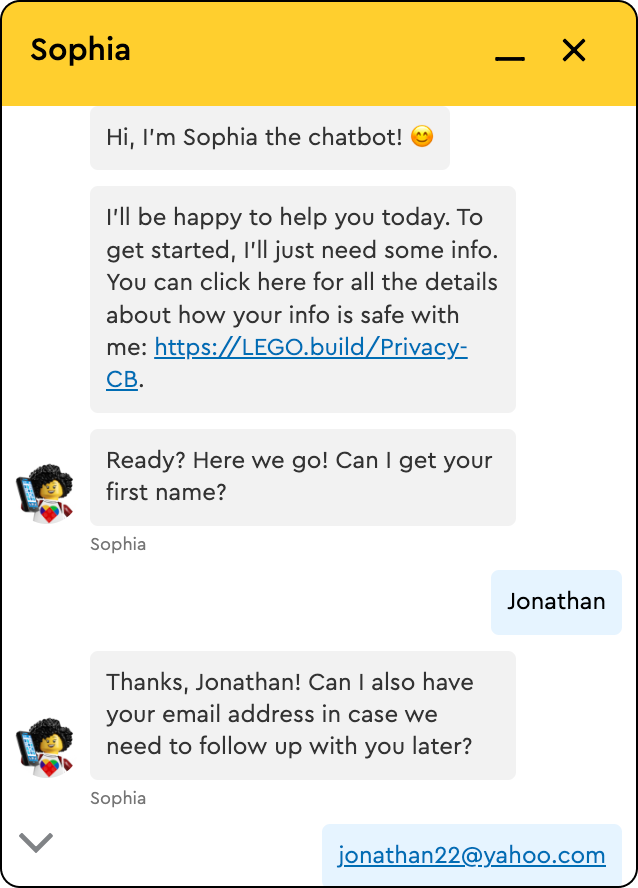
You’ll notice their chatbot has a name too. These small details go a long way in creating interactions that feel natural, authentic, and tailored to each shopper.
3. HM
One thing H&M’s chatbots do exceptionally well is ask for customer feedback after every interaction.
Asking users if their query was solved, how satisfied they were with the interaction, and how accurately the chatbot understood what they were looking for is the best way to discover what’s working well and where there is room for improvement.
Chatbots rely on generative AI and are designed to get better over time. Directly asking shoppers for feedback can help streamline this process and continuously optimize chatbots for the best possible user experience.
4. Clinique
Clinique is a prime example of how chatbots can work in conjunction with human agents. They offer support on a handful of predetermined topics or immediately connect you to a live agent.
If a shopper is looking for a product, Clinique’s agents ask questions to personalize their recommendation. Look how efficiently and effectively they help shoppers find what they’re looking for.
Plus, they make it easy to add recommended products to shopping carts and keep you engaged by offering relevant discounts and promotions. This shopper-first approach is an effective way to shorten the path to purchase, build customer loyalty, and drive sales.
5. 1-800-FLOWERS
The 1-800-Flowers chatbot does an excellent job guiding users through the shopping journey.
Shoppers can give the intended recipient’s name and address, explore flowers that fit a specific occasion, and quickly navigate the check-out process- all with help from the chatbot.
One of the best parts about this chatbot is that it offers images of relevant flowers and bouquets to help shoppers narrow down their search. This is a convenient way for shoppers to view the different arrangements offered so they can make confident purchase decisions.
The conversational commerce approaches and techniques mentioned above highlight some of what’s possible with chatbots and virtual assistants. However, keep in mind that customers’ needs vary from industry to industry. When implementing a chatbot in your store, you must understand your specific shoppers so you can program your chatbot accordingly.
Conclusion
Conversational Commerce is a game-changer. By leveraging chatbots and virtual assistants, retailers can meet customers where they are and engage with them in real-time. This enhances the user experience, optimizes sales and marketing efforts, and streamlines customer support.
Many online businesses are already using conversational commerce. However, advances in conversational AI are transforming the Ecommerce industry, reshaping what’s possible, and creating new opportunities for retailers.
If you aren’t already implementing conversational commerce into your Ecommerce strategy, the time to start is now.
FAQ
How can conversational commerce impact my online retail business?
Conversational commerce significantly impacts retail business in many ways. By providing personalized and interactive communication with customers in real-time, retailers can increase engagement and offer a more satisfying shopping experience.
One way to increase engagement is by offering personalized responses and product recommendations on customers’ preferred channels. By showing shoppers they understand them and can meet their needs, retailers can develop stronger relationships and drive more sales.
Additionally, chatbots provide automated customer support, which helps retailers cut costs on overhead (think physical storefronts, staff, etc.). Delivering a seamless multi-channel Ecommerce experience to shoppers can improve customer satisfaction and helps maximize overall business growth.
What are the risks and challenges of implementing conversational commerce?
There are many advantages to conversational commerce, but there are risks and challenges businesses must consider too. It’s important to understand that the lack of human support may hinder the customer journey for certain shoppers. This is largely because chatbots and artificial intelligence algorithms struggle to understand shoppers’ inquiries, which can result in irrelevant or non-useful communication. The best way to prevent this happening is to implement algorithms and machine learning for Ecommerce specifically.
Privacy and security concerns are prominent too. Customers may fear sharing sensitive data like their address or credit card information with a chatbot or virtual assistant. Lastly, the integration process can present problems for Ecommerce sites as well. That said, online businesses can help prevent or mitigate these problems by continuously testing, monitoring, and optimizing their solutions.
How can I ensure my customers have a positive experience with conversational commerce?
The best way to create a positive experience with conversational commerce is by providing clear communication, personalized services, and proactive assistance. Offering convenient, immediate, and relevant answers to shoppers’ inquiries will help build brand trust and a positive impression of your store. It is also important to ask for feedback to continually improve the user experience.
On the technical side, finding conversational chat platforms that integrates seamlessly across all channels will help you maintain a consistent shopping experience. Lastly, make sure to inform shoppers about the security and privacy measures your store takes to protect their data. Each of these steps will help enhance the customer journey with conversational commerce.
For a comprehensive understanding of conversational commerce, check out our other articles on this topic covering its fundamentals, types of platforms and implementation strategies.

